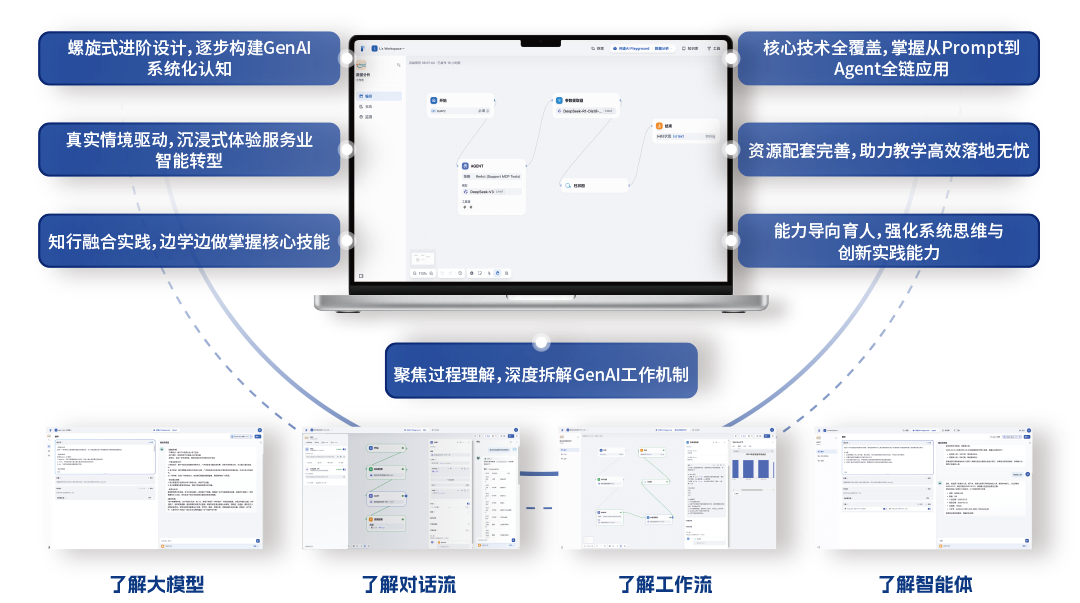人工智能应用开发与实践系列实验课程
该课程通过一套由浅入深、层层递进的训练,培养学生的AI思维和应用开发能力。课程内容覆盖了从大模型(LLM)选择、提示词(Prompt)设计、对话流(Chatflow)与工作流(Workflow)的策划搭建,直至智能体(Agent)开发的全链路应用。通过四类紧贴行业实际、具有动手性和进阶性的核心实验任务,如智能客服搭建、数据分析工作流和智能营销Agent搭建等,帮助学生系统性地建立AI应用思维,掌握能带走、用得上的操作技能。
课程特色
1. 体系化进阶,螺旋式上升:从基础大模型认知与提示词工程入手,逐步深入工作流搭建、RAG知识库应用及复杂对话流设计。最终对具备自主决策与工具调用能力的智能体(Agent)进行设计与分析。内容编排层层递进,确保学生循序渐进地掌握核心概念和技能。
2. 紧贴行业前沿,场景驱动教学: 所有实验任务基于酒店、景区、研学旅行等服务业场景设计,涵盖酒店财务分析、客户服务Chatbot、景区行程规划、营销及研学Agent等典型应用,使学生通过解决实际业务问题学习相关技术,理解生成式人工智能的应用价值与挑战。
3. 重实践与分析,不止于“用”: 在指导学生使用生成式人工智能系统进行交互的同时,引导学生分析其背后的工作原理,如:客户服务Chatbot的意图理解、RAG知识库的检索、查询转换,以及智能体Agent的决策与工具调用机制。以此培养学生透过现象看本质的批判性思维能力。
4. 全面覆盖关键AI技术点: 本系列实验涵盖了当前生成式人工智能应用中不可或缺的核心技术
● 大型语言模型(LLM)基础与特性
● 实现精准意图的关键:提示词工程与优化
● 连接AI与外部世界的桥梁:生成式人工智能工作流(Workflow)与模式
● 赋予AI知识:知识库构建与管理
● 实现智能对话:对话流(Chatflow)、意图识别、多轮对话与记忆管理
● 让AI执行行动:智能体(Agent)概念、工具调用、Agent行为分析
5. AI辅助评价,破解教评痛点:课程采用AI辅助评价机制,解决传统教学模式下教师评价工作量大、难以兼顾每位学生个性化反馈的痛点。通过智能分析学生的实验作品及报告,提供即时、客观、多维度的评价与具体改进建议,帮助教师更精准地掌握学情,助力学生个性化发展与能力提升。
6. 立即上手的教学与实验资源:每个实验任务配有详细的教学目标、完整的实验过程设计,以及供技术人员搭建实验环境的详细技术指引,极大程度方便教师备课和实验环境搭建。
7. 注重能力培养与素养提升:全套实验设计融入了科学探究、批判性思维、系统分析、问题解决以及负责任的AI应用与伦理意识等高阶素养培养目标,助力学生成为全面发展的未来人才。
教学技术与工具
AI应用开发与实践平台

主要实践内容
1. 了解大模型:构建企业级人机协同与智能策划能力
● 基础知识:了解大语言模型基本工作原理 ,掌握提示词撰写技巧。
● 进阶知识:了解增强大模型思维能力的思维链(CoT)与推理-行动(ReAct)等高级提示词技术。
实验任务一:大模型初探与提示词工程,策划并设计酒店/景区营销策划聊天助手,对比不同模型及技术的效果。
2. 了解对话流:构建智能化客户服务体系与专属知识库
● 基础知识:了解Chatflow(对话流)并设计智能客服,构建专属知识库。
● 进阶知识:了解意图识别与大模型记忆管理。
实验任务二:酒店/景区数据分析Workflow的策划与实施
3. 了解工作流:流程再造与科学决策
● 基础知识:通过 Workflow(自动化工作流)设计数据分析工具。
● 进阶知识:掌握针对复杂报表数据的知识库切片技巧。
实验任务三:酒店运营/财务数据分析Workflow的策划与实施,使其能调用工具并输出数据可视化图表。
4. 了解智能体:部署 AI“数字员工(Agent)”与业务自动化
● 基础知识:学习智能体(Agent)的编排与设计。
● 进阶知识:掌握智能体(Agent)中工具调用能力。
实验任务四:酒店/景区智能营销Agent的策划与实施。
